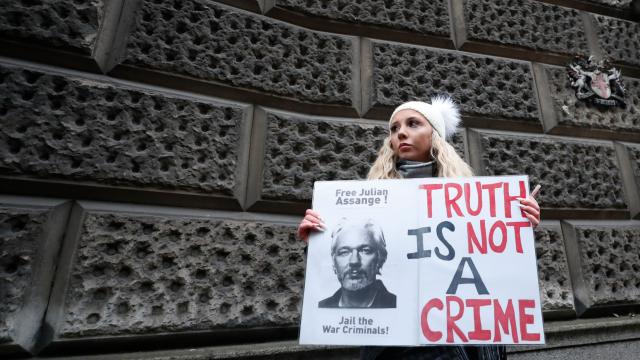Warning: This article deals with the topic of suicide and may be triggering for some. If you or someone you love is in need of support, please contact Lifeline: 13 11 14
A judge in the UK ruled on Monday that Wikileaks cofounder Julian Assange should not be extradited to the U.S. to face computer hacking and espionage charges brought by President Donald Trump’s Justice Department, according to a ruling posted online and statements made in court. The judge cited Assange’s depressive state and risk of suicide while handing down the surprise ruling, which will likely be appealed by U.S. lawyers.
“Mr. Assange faces the bleak prospect of severely restrictive detention conditions designed to remove physical contact and reduce social interaction and contact with the outside world to a bare minimum. He faces these prospects as someone with a diagnosis of clinical depression and persistent thoughts of suicide,” Judge Vanessa Baraitser wrote in her ruling.
Monday’s ruling noted that Assange could be placed in solitary confinement for 23 hours per day while awaiting trial in the U.S., a punishment considered to be torture by most of the developed world. The ruling also cited Jefferey Epstein’s suicide in a New York prison.
Assange faced 17 charges in the U.S., including computer hacking and a violation of the 1917 Espionage Act. The charges could’ve brought a maximum of 175 years in prison. As Gizmodo’s Dell Cameron pointed out back in June, there are a number of plot holes in some of the Justice Department’s charges.
Judge Baraister rejected arguments from Assange’s lawyers that he would not receive a fair trial in the U.S. and insisted that he would receive American constitutional protections because he will be extradited to U.S. soil. Assange is an Australian national and the U.S. government has previously denied foreigners constitutional protections while in U.S. custody, with the most infamous cases being prisoners held at Guantanamo Bay, Cuba.
Judge Baraitser also claimed that Assange went beyond what journalists are legally allowed to do while reporting, echoing the U.S. government’s claims that Assange helped Chelsea Manning hack into sensitive computers owned by the U.S. Department of Defence in 2010.
But ultimately, Baraister decided that Assange should not be extradited because he faced the high possibility of being placed in solitary confinement. An expert noted that Assange had a history of self-harm, including cutting of his wrists as a young man, but stated that he had never previously tried to suicide.
Assange’s lawyers and a witness claim that Assange was offered a pardon by U.S. President Donald Trump in exchange for helping Trump. The president reportedly wanted Assange to deny that his sources for the DNC email hack involved the Russian government. Assange did not give up his sources and has previously suggested the documents came from the late Seth Rich, a conspiracy theory that Assange has helped encourage.
Advocates for Assange, including Stella Moris-Smith Robertson, the mother of two of Assange’s children, have lobbied President Trump to pardon Assange via Twitter. The two children were fathered while Assange was in London’s Ecuadorian embassy and claiming asylum. Stella Moris-Smith Robertson says she’s engaged to be married to Assange, though the man himself has not stated as much publicly.
But Baraister said that Assange’s family situation was not extraordinary and had no bearing on her decision.
“I found that the inevitable impact that extradition will have on his partner and children and family is nothing out of the ordinary in the context of extradition proceedings,” Judge Baraitser said at Monday’s hearing.
“I am satisfied that Mr. Assange’s suicidal impulses will come from his psychiatric diagnoses rather than his own voluntary act,” Baraister wrote.
“I find that the mental condition of Mr. Assange is such that it would be oppressive to extradite him to the United States of America.”
